New Delhi: A portrait of Shravan Kumar, the ultimate doting son of Hindu mythology, is painted on the walls of the Blissful Old Age Foundation in Delhi. “Those who serve their parents need not pray,” reads the Hindi writing nearby. Inside the dormitory, destitute and abandoned elderly lie on narrow beds. Some have gangrene, others cough incessantly. In the evening, they gather to watch the news together and share stories of the lives they once lived.
It’s a scene that shatters the picture-perfect postcard image of India as a tradition-bound, family-first culture that cherishes its elders till the very end. Ancient Hindu epics are replete with tales of dutiful sons and daughters. It’s a moral and cultural trope few dare to violate. That is why, when the Bollywood film Baghban hit the screen, it stirred the nation’s conscience. Not only did it portray the elderly as cool and fun, far from the temple-going cultural stereotype, it also came across as a finger-wagging admonition of the post-1991 nuclear family—self-absorbed, ruthless, and unmindful of civilisational values.
More than 20 years after the movie was released, research and reports by the Ministry of Health and Family Welfare and Niti Aayog continue to cite the breakdown of traditional family structures as a leading cause of elderly distress. Most elder abuse goes unreported, unfolding behind closed doors in the privacy of the family unit. While the financially independent elderly live on their own terms in posh senior housing complexes, those without resources are at greater risk of facing neglect, hostility, or outright abandonment.
“We have old age homes for the poor, but the government needs to build infrastructure for middle-class and lower middle-class groups. A grey tsunami is coming, and we need to prepare for it,” said Dr Abha Choudhary, chairperson of Anugraha, an NGO working for senior citizen welfare.
At least 40 per cent of India’s elderly live below the poverty line, many with no income streams, leaving them dependent on family and vulnerable to abuse, according to the 2023 ‘India Ageing’ report by UNFPA. A 2022 study by the Ministry of Health and Family Welfare report found that 5.2 percent of senior citizens surveyed reported ill treatment. And the latest data from the Ministry of Social Justice and Empowerment shows that more than 78,000 cases of crimes against the elderly were registered between 2019 and 2021, including murder, attempt to murder, rape, robbery and extortion.
My son and daughter-in-law didn’t feed me properly, even abused me verbally and physically. They have now told me they don’t want to see me at all and dropped me here
-70-year-old former nurse, now a resident of Blissful Old Age Foundation
Institutional settings such as nursing homes are not necessarily a respite either. Globally, one in six people over the age of 60 faced some form of abuse in such facilities between 2023 and 2024, according to a World Health Organization study.
With India’s elderly population poised to skyrocket— 20 per cent of the country’s population will be above the age of 60 by 2050—calls for intervention are getting more and more urgent. The Maintenance of Parents and Senior Citizens Act (2019) tabled in the Lok Sabha lists punitive action, six-month imprisonment or Rs 10,000 fine for children who abuse their parents, as well as formation of a separate tribunal for senior citizens.
“The Maintenance and Welfare of Parents Senior Citizen Act 2007 is very comprehensive, but hardly any elderly person has awareness about it. Awareness and sensitisation of the elderly about their rights is urgently needed,” Choudhary said.
Kicked out of their houses, emotionally tortured, or financially drained, most residents of the Blissful Old Age Foundation tell stories of abuse, neglect, and helplessness that fly in the face of the cultural promise of respect and care for elders in India.
The stigma around reporting family members for abuse is so strong that even physical injuries are often concealed. At AIIMS’ National Centre for Ageing, elderly patients often turn up with bruises that doctors say seem caused by violence at home.
Also Read: Geriatric medicine is India’s new priority. Elderly were forgotten in Youngistan for 2 decades
Discarded by their own
Three suitcases contain the entire world of a 70-year-old former nurse taking refuge at the old-age home in Delhi’s Nangloi. Dressed in a faded gown, she cries about the kind of abuse she had faced at home.
“My son and daughter-in-law didn’t feed me properly, even abused me. They have now told me they don’t want to see me at all and dropped me here,” she said. She never filed a police complaint.
She lies on a bed in a bare, colourless room bereft of cupboards, shelves, art, and even a fan. The conflict with her son and daughter-in-law constantly plays in her head. She has no escape.
“I don’t even have a smartphone to watch my favourite TV shows on,” she said with a helpless smile.
After her son and daughter-in-law conceived their first child three years ago, they began neglecting her, she said. It became clear to her that they wanted her to leave the house.
She recalled a time when she had access to fruits, vegetables, eggs, and other groceries in the refrigerator. But over time, she was seen as a financial burden and deprived of these foods.
“I used to have two eggs and bread for breakfast every day. My son and daughter-in-law didn’t like it, so they started hiding eggs from me. I was forced to ask my son if he had eggs, and he said he doesn’t have the money to buy them,” she said.
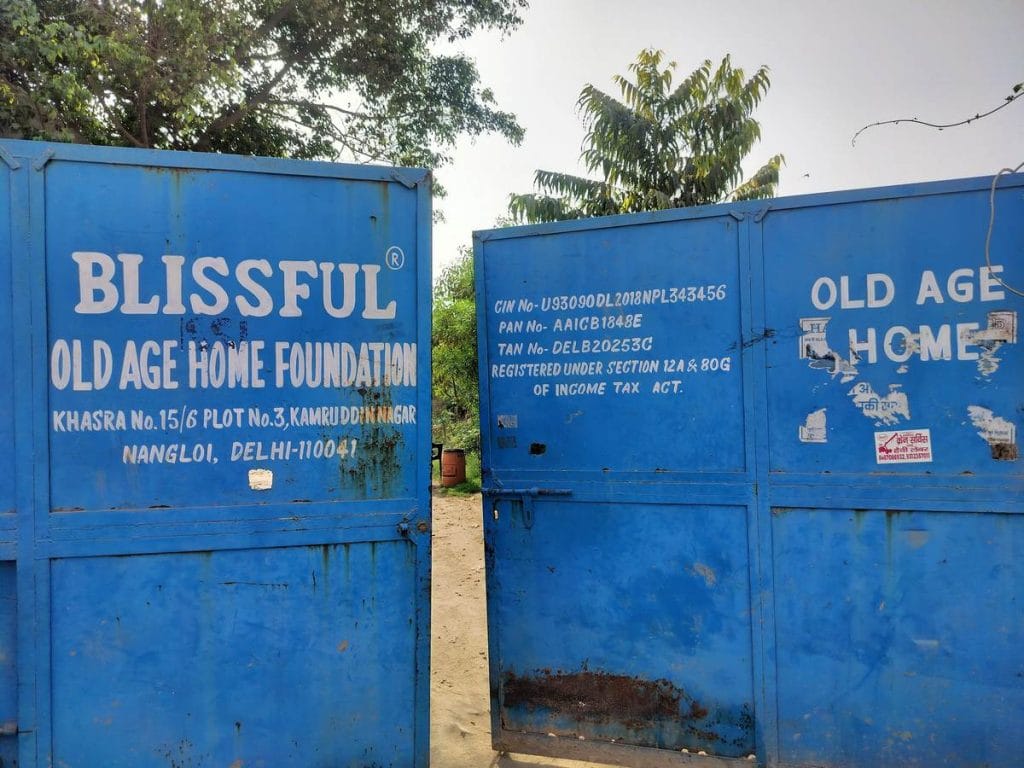
Slowly, she added, the mistreatment escalated. Her daughter-in-law would hurl insults while her son stood by and watched. They gave her Rs 500 a month to buy toiletries, groceries, and eggs for herself. She was not allowed to eat anything cooked for the rest of the family. She had to prepare her meals with her ration separately.
There was less and less space for her in their 2BHK flat in North Delhi, which her son had bought after years of living in a slum. Two months ago, they dropped her off at the old age home with her three suitcases. While they still pay for her medicines, they haven’t visited her since.
ThePrint reached out to her son via WhatsApp but he did not respond. A representative of the old age home, however, called to request that no further contact should be attempted with the son.
For many senior citizens, the fear is not of living alone, but of dying alone.
“I have led a long life, it doesn’t scare me anymore. I will make do. But what I am truly scared of is who will perform my last rites?” said a retired marketing professional living alone in Delhi. “Will my son at least come back to collect my ashes? I think about that a lot.”
A 2024 study by HelpAge India found that 7 per cent of the elderly in a sample of 5,169 reported abuse. Of these, 42 per cent said their sons were primary abusers, and 28 per cent cited daughters. Seniors who weren’t financially secure were more vulnerable.
Breaking the silence around elder abuse
Senior citizens like the retired nurse are silent victims of shrinking houses and rising inflation. There is no definitive data on how many have been abandoned, but the growing number of residents in old age homes and ashrams across the country tells a story. The happy joint family ideal is cracking.
Cases of parents seeking maintenance from their children have also gone up. According to data from the Ministry of Social Justice, the 11 tribunals set up for such claims have seen a year-on-year increase. But the data is only available till 2017.
In 2021, the Government of India launched Elderline, a national helpline for senior citizens that offers counselling, support, and intervention in abuse cases. By the end of 2024, it had received 24 lakh calls. The Delhi Council for Senior Citizens receives three to four distress calls every day, according to its president, JR Gupta.
A 2024 study by HelpAge India found that 7 per cent of the elderly in a sample of 5,169 reported abuse. Of these, 42 per cent said their sons were primary abusers, and 28 per cent cited daughters. Seniors who weren’t financially secure were found to be more vulnerable to abuse.
It is children who leave their parents’ nest to build a new one. I never thought mine would just kick me out and stake claim to the one I had built
-Resident of Ma-Dham shelter home, Vrindavan
“Elder abuse increased with decrease in income of the respondents and majority of the respondents (73%) who have faced abuse reported an annual income of less than Rs 1 lakh. By and large, almost all elderly (94%) who have faced abuse, reported at least one chronic disease,” the report said.
Lawyers, activists, and social workers say elder abuse is shrouded in silence and severely under-reported.
“If at all a senior citizen musters the courage to actually walk up to a police station, which is very rare, it means the abuse has crossed the limits. Then only they go. Otherwise, they don’t go at all,” said Choudhary. She added that she has observed a steady rise in cases of abuse over the last 7-8 years, especially after the death of a spouse.
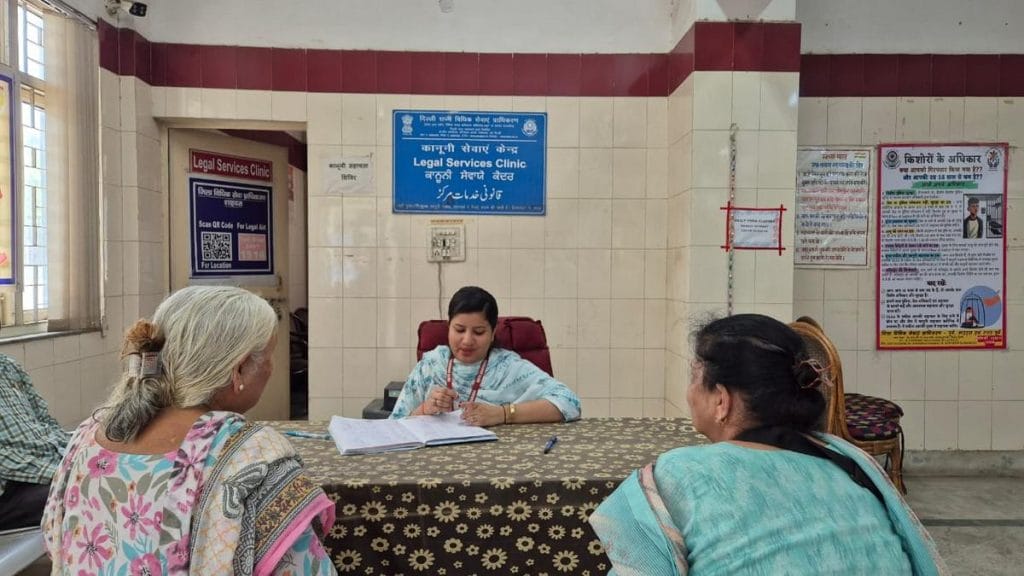
The stigma around reporting family members for abuse to the authorities is so strong that even physical injuries are often concealed. At AIIMS’ National Centre for Ageing, elderly patients often turn up with bruises on their arms, legs, or abdomen.
“We see such patients all the time, and it’s very clear that those marks are from violence they’re facing at home. But they never admit to it, blaming the marks on their bodies as a result of ‘falls’ in the house,” said Dr Avinash Chakravarthy, head of geriatric medicine at AIIMS.
Some institutions have begun responding. The Delhi High Court has taken note of rising abuse cases and has set up a free legal aid clinic for senior citizens under the Delhi Legal Services Authority. NGOs are doing their part as well. Anugraha oversees Swabhiman Parisar, a day care centre where more than 2,000 elderly are enrolled. It is also training an army of senior citizens to battle abuse in the neighbourhoods of Delhi.
“In the last eight years, along with the Delhi Legal Services Authority, we have trained around 250 senior citizens as paralegal volunteers. They know their rights, they know their duties, and we place them in family courts, NGOs, and police stations so they can educate others in their peer group,” Choudhary said.
Financial burden, space crunch, and unemployment are some of the reasons children are forcing their parents out of their houses, Manjot Singh, the coordinator of Ma-Dham in Vrindavan, said.
Ashrams and abandonment
Abandonment and neglect of parents are familiar themes in Bollywood. While Baghban became the definitive tale of parental mistreatment by callous children, others have made a mark too.
In Avtaar, a 1983 film starring Rajesh Khanna and Shabana Azmi, an ageing father is cast aside by his son but cared for by a loyal domestic worker. The father also opens a home for others with ‘cruel relatives’. Last year, Vanvaas, starring Nana Patekar, told the story of a dementia patient who is abandoned by his sons in Varanasi.
These films draw from a reality that has played out across India for decades. Uttar Pradesh’s Vrindavan, Mathura, and Varanasi have become a refuge for abandoned elders, especially women, with nowhere else to go. Some arrive by train or bus. Others are deposited by family members.
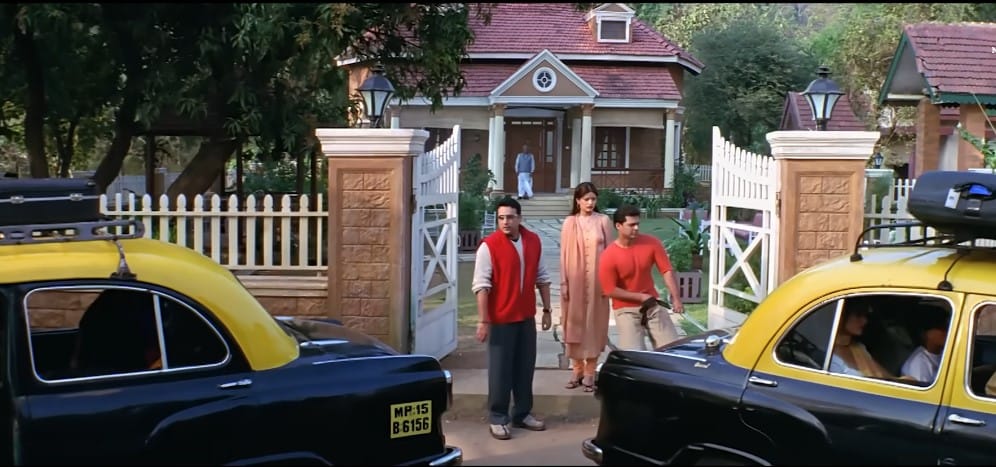
Ma-Dham, an ashram run by the NGO Guild of Service, is one such shelter, catering only to women, mostly widows.
“So many turn up here at our ashram. Sometimes their children or relatives drop them off, other times police send them to us from railway stations or temples,” said Manjeet Singh, project coordinator.
The women at Ma-Dham are hesitant to share their stories. Almost every resident claims to have been shunned not by their own progeny but ‘stepchildren’. Some are embroiled in legal disputes to reclaim their properties.
We set up action teams who would go to the houses of senior citizens who were facing abuse. We would tell the children to behave properly, or tell them that their employers would be informed about their behaviour with their parents
-JR Gupta, president of Delhi Council for Senior Citizens
One resident described her journey from Moradabad to Vrindavan, as well as her battle with her stepson.
“After my husband’s death, my stepson wrested control of the house, which is still in my name, and forced me out of the house. I went to stay with my brother, but didn’t want to overstay my welcome, so about a year ago I took a train to Vrindavan,” she said.
She’s gone to court over the house, but she’s tired of fighting. “It is children who leave their parents’ nest to build a new one. I never thought mine would just kick me out and stake claim to the one I had built,” she added.

Financial burden, space crunch, and unemployment are some of the reasons children are forcing their parents out of their houses, Manjot Singh, the coordinator of the facility, said. As a counsellor, he regularly speaks to senior citizens who face some sort of neglect in their own households.
“Unemployment is at its peak in the country. And houses are small, where it is difficult to fit a lot of people. So when children’s families expand they typically cut their off parents’ rations, neglect them. Parents often leave for the sake of their own dignity or they are abandoned,” Singh added.
This pattern is not limited to rural areas or poor families. In February 2024, for instance, cricketer Ravindra Jadeja’s father, Anirudh, spoke publicly of strained ties with his son, saying he lives on a paltry pension of Rs 20,000 a month. After a high-profile legal battle, Raymond founder Vijaypat Singhania also found himself alone in a rented flat, claiming his son would be happy to see him “on the road”.
Neglect at home, help from community
JR Gupta’s phone never stops ringing. On the other end are elderly people complaining of abuse and pleading for help.
Gupta founded the Senior Citizens Council of Delhi in 2006 as a laughter club in Deer Park. That small club has grown into an organisation that now claims to have 11 lakh members.
“When we founded the organisation, we found a lot of seniors were being tortured by their children. I wanted to look for a way to counter such abuse,” Gupta said.
Over the years, several members of the organisation have reported being neglected at home or harassed for property. It’s not just family members—Gupta has also heard stories of neighbours and tenants taking advantage of elderly people living alone by encroaching on their properties or refusing to leave.
If at all a senior citizen musters the courage to actually walk up to a police station, which is very rare, it means the abuse has crossed the limits. Then only they go. Otherwise, they don’t go at all
-Dr Abha Choudhary, chairperson of Anugraha
“We set up action teams composed of representatives of the council, who would go to the houses of senior citizens who were facing abuse. We would tell the children to behave properly, or tell them that their employers would be informed about their behaviour with their parents,” Gupta said.
This kind of warning, he added, has been effective as a deterrent, as it instilled a fear of reputation suffering at the workplace.
Today, the council receives 3-4 calls a day. Its goal is to resolve at least two cases every fortnight, which are published on the front page of its monthly newsletter.
Under the Maintenance and Welfare of Parents and Senior Citizens Act, 2007, elderly citizens can also approach their district maintenance tribunal. The tribunal is mandated to resolve complaints within 90 days and can order children or relatives to pay maintenance.
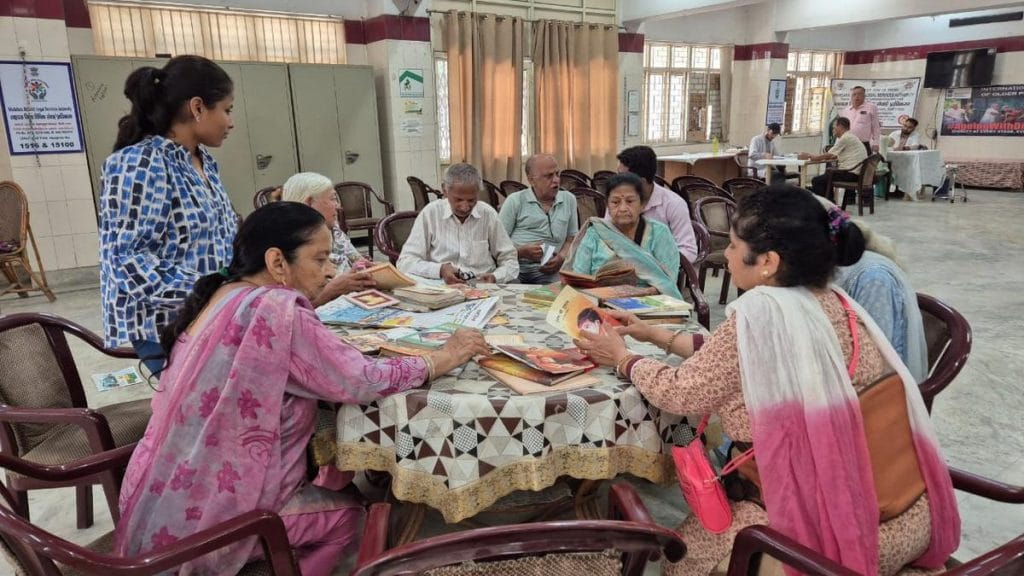
Gupta says the council spends considerable time helping seniors understand their rights under this law.
“Children don’t even talk to their parents inside their houses, they don’t give them food to eat. We ensure that our members are empowered by exercising their right to get maintenance,” he added.
But the process is not as smooth as it looks on paper, according to Meera Khanna, director of the NGO Guild of Service. Complaining against family members can further complicate the lives of the elderly.
“Approaching the district is not the best option. The old people might die before a resolution is reached. And imagine how difficult it becomes for an old couple to live in the same house once they’ve complained,” Khanna said.
Also Read: How India’s seniors are fighting loneliness—Love, loss, and logins
Loss and loneliness
At a roadside family counselling centre run in Mathura by the Guild of Service, a 62-year-old sobbed into her handkerchief as she told the story of leaving her house. After a physical altercation with her son in Delhi, she left and moved to Mathura.
It was after an appeal under the Maintenance Act that her son agreed to give her Rs 7,000 a month. With that, she rents a small apartment and buys groceries in the city.
“The Rs 7,000 isn’t much, but it helps me get by,” said the elderly woman, who doesn’t wish to move back to her house.
Nivedita Das, who supervises an ashram for the elderly, said that the introduction of a pension for senior citizens under Atal Pension Yojana, widow pension, and the Ayushman Bharat health card have helped reduce the risk of abandonment by easing the economic burden on families.

But the loss of relationships at times can hurt even more than a lack of funds.
Stripped of all money, the retired nurse at the Blissful Old Age Foundation keeps phoning her son but the calls never go through. She suspects he has blocked her. It shatters her. Govind Singh, the coordinator at the old age home, is hopeful that her son will eventually take her back. But the 70-year-old doesn’t share the sentiment.
“I don’t think he wants me there,” she said, with pain in her eyes.
This article is part of Grey World, a series on India’s senior communities. Read all articles here.
(Edited by Asavari Singh)



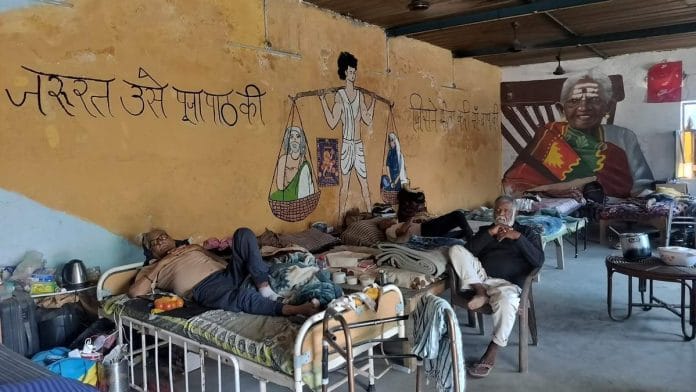



Why should government look after the elderly? Is it not the responsibility of children and shouldnt society demand that. Isnt it as outrageous as saying we will leave children in pursuit of our lifestyles and government should take care of them.